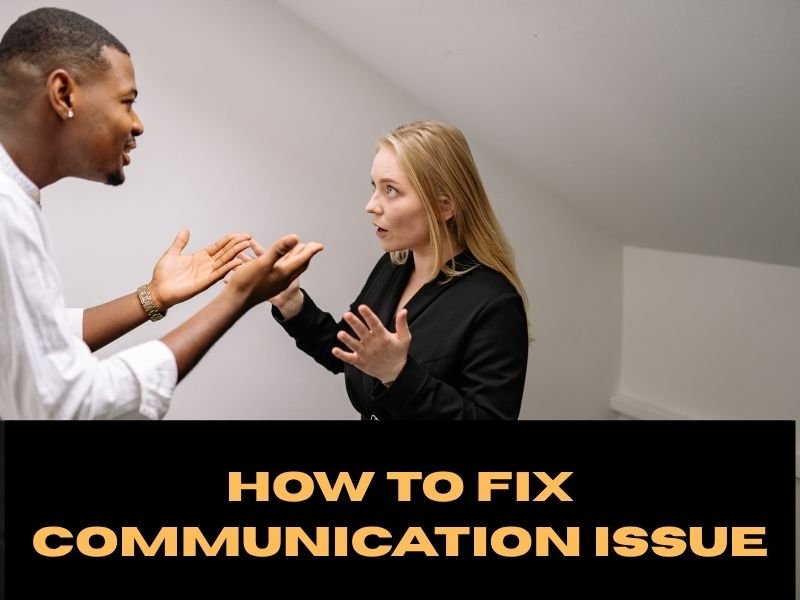Fix communication issues in a relationship, and you’ll unlock a powerful foundation for lasting love. This is because among the many important practices in a relationship, none is more essential in creating and maintaining love than effective communication between the couple. When there is little or no communication, it usually implies that there is little to no love in that relationship. Communication is the foundation of love. Whether you are in a long-term relationship or just starting, the ability to express yourself clearly and understand your partner is essential. Yet, for many couples, miscommunication is one of the most common sources of conflict and disconnection. Left unchecked, it can silently erode the emotional bond between two people who genuinely care about each other.
Communication isn’t just about words, as suggested by a few. Think of it as building a bridge between you and the person you are dating. The key to this is that if you improve communication with your partner, you will automatically enhance love. There are ways to improve the communication between you and your spouse. It includes tone, timing, facial expressions, body language, and even the pauses between conversations. When something feels “off,” it’s usually not just what was said, but how it was delivered. Many couples fail to recognize these subtle cues, which leads to assumptions, misunderstandings, and unnecessary arguments. Before you can fix anything, you need to understand the full picture of what communication truly means in the context of a relationship.
Understand What Healthy Communication Looks Like
Healthy communication is honest, respectful, and intentional. It goes beyond just “talking,” it’s about creating a safe space where both partners feel heard, valued, and understood. When communication is strong, couples can navigate conflict without hostility, express needs without fear, and build emotional intimacy over time. It’s the difference between reacting and responding, between speaking to be right and listening to truly connect. One clear marker of healthy communication is the balance of giving and receiving.
If one person dominates the conversation or avoids difficult topics altogether, the dynamic becomes strained. In a healthy relationship, not only should both partners be able to speak freely, but they also should know when to pause and listen. They are supposed to be aware of each other’s triggers, and then work together, not against each other, when tension arises. Understanding this simple but important concept is key before diving into the strategies to fix communication issues in a relationship. Practice good feedback methods. Say or do what you will, but always make sure, through feedback, that the other person is understanding your words and intentions.
Common Signs of Poor Or NO Communication in Relationships
Fixing communication issues in a relationship starts by recognizing and admitting that things are off. Often, couples don’t realize or admit that there is a communication problem until it begins to affect trust, sexual intimacy, and daily connection. Some common signs include constant misunderstandings due to pride, passive-aggressive remarks, avoiding difficult topics, or shutting down emotionally during conflicts. When partners frequently interrupt or talk over each other, it signals a breakdown in mutual respect and attention.
Another red flag is the presence of recurring arguments over the same issues without resolution. This usually happens when one or both partners feel unheard or invalidated. Silence, sarcasm, dismissiveness, and blaming can also indicate poor communication habits. These behaviors, over time, create emotional distance and resentment. Spotting these patterns early is crucial to begin the healing process and re-establish a healthy connection.
The Role of Emotional Safety in Communication
Fixing communication issues in a relationship requires emotional safety, an environment where both partners feel secure enough to express themselves honestly without fear of judgment, retaliation, or ridicule. When emotional safety is present, vulnerability thrives. Partners can share their feelings, concerns, and needs openly, which strengthens trust and encourages deeper connection. Without this safety, even the best communication techniques fall flat, as fear or defensiveness will cloud every conversation.
Many couples unknowingly create unsafe spaces by criticizing, interrupting, or invalidating each other’s emotions. These behaviors send a message that it’s not safe to be real or raw, and so both parties may start hiding their true feelings. To build emotional safety, couples must practice empathy, use non-defensive language, and show consistent respect. Over time, this builds a secure foundation where honest communication becomes second nature. Couples need to find more effective ways to communicate their love for each other, and hopefully, better receive the love they need for themselves as well.
Listening Is More Important Than Talking
Fixing communication issues in a relationship often has less to do with saying the right thing and more to do with truly listening. Active listening means giving your partner your full attention, not just waiting for your turn to speak. When you listen attentively, without interrupting or forming a counterargument in your mind, you demonstrate that you value their thoughts and feelings. This small shift can have a profound impact on how safe, respected, and heard your partner feels.
Many relationships are suffering not because of a lack of words, but because of a lack of presence. In the rush to defend ourselves or explain our intentions, we miss the heart of what our partner is trying to say. Practicing active listening involves maintaining eye contact, showing empathy, asking clarifying questions, and paraphrasing what your partner shares. These habits show that you’re genuinely engaged, and they help prevent misunderstandings before they spiral into arguments.
The Power of Non-Verbal Communication in Relationships
Fix communication issues in a relationship by paying close attention to non-verbal cues, often more telling than words themselves. This is very common among men. Body language, tone of voice, facial expressions, and even silence all communicate the emotions and intentions of a man. A cold shoulder, lack of eye contact, or crossed arms might not be spoken insults, but they can still send hurtful messages that erode trust and emotional connection over time.
On the other hand, warm gestures like a gentle touch, nodding in agreement, or smiling during conversation reinforce feelings of safety and love. Couples who are attuned to one another’s non-verbal signals tend to resolve conflict faster and build stronger bonds. It’s essential to ensure your body language supports, rather than contradicts, what you are trying to say. Communication is not just about talking, but it is about how you show up emotionally and physically in each interaction.
Communicating During Conflict Without Causing Damage
Fix communication issues in a relationship by learning how to handle conflict calmly and respectfully. Arguments are inevitable in any partnership, but it’s how you argue that determines the strength and quality of the relationship. Avoid blaming, yelling, or using words as weapons, as these tactics will only create emotional wounds that are harder to heal over time. So, the first step in resolving a conflict is to try to see what we are doing that causes problems and A good approach to this is by asking our partner to advise us and tell us what it is that they see we are doing that may be contributing to the conflict.
It’s also important to know when to pause and take a break during heated moments. Emotions can cloud judgment and escalate the situation unnecessarily. Giving each other space to cool down and revisit the topic later with a clear mind promotes resolution instead of resentment. Healthy conflict isn’t about winning, it’s about understanding each other better and moving forward together.
Set A Clear Communication Boundary
Fix communication issues in a relationship by setting healthy boundaries around how, when, and where you communicate. Every couple has different tolerances, and some people need space during conflict, while others crave immediate resolution. What matters is agreeing on what works best for both of you. For instance, setting a rule like “no serious talks before bed” or “no yelling during disagreements” can create a safer emotional environment.
Boundaries aren’t about limiting expression, but they are about ensuring communication is productive rather than damaging. When both partners understand each other’s emotional limits, their conversations become more respectful and focused. These mutual agreements reduce misunderstandings, build emotional security, and will also give you both the structure to have hard conversations without hurting the relationship.
Break Negative Communication Patterns
Fix communication issues in a relationship by identifying and interrupting negative patterns like criticism, stonewalling, defensiveness, or sarcasm, as these behaviors may become habits over time, creating a toxic loop that drives emotional distance. The first step is awareness, and recognizing when you or your partner slips into these destructive cycles.
Once identified, replace those patterns with healthier alternatives. For example, instead of saying, “You never listen to me,” try, “I feel unheard when I talk about things that matter to me. Express how you feel without assigning blame. Pausing during a heated moment, breathing, and choosing empathy over ego can dramatically shift the energy of any conversation. Real change begins when you choose understanding over winning.
The Importance of Timing in Communication
Fix communication issues in a relationship by understanding that how you talk can be just as crucial as what you say. Bringing up a sensitive topic when your partner is stressed, distracted, or exhausted will often lead to miscommunication or defensiveness. Poor timing can turn a well-meant conversation into an unnecessary argument.
Instead, choose moments when both of you are calm, emotionally present, and mentally available. Create a comfortable space that invites open dialogue, not resistance. If necessary, schedule conversations about deeper. This shows respect for each other’s time and emotions. Healthy communication isn’t just about expressing your thoughts; it’s about ensuring they are received in the right frame of mind.
Stay Calm During Heated Discussions
Fix communication issues in a relationship by learning how to manage emotional intensity during conflicts. Heated discussions are natural, but when voices rise and tempers flare, clarity will vanish. Staying calm always doesn’t mean suppressing your feelings; it means regulating them so they don’t hijack the conversation. Take deep breaths, pause before responding. Remember, the purpose of communicating is to fix things and not escalate them.
It’s also helpful to recognize your signs of escalation, clenched fists, a racing heart, or feeling the urge to interrupt. When these arise, be quick to suggest to your partner a short break to collect your thoughts. Coming back to the conversation with a level head allows you to listen better and respond more constructively. Staying calm protects the emotional safety of the relationship and keeps both people focused on resolution, not just reaction.
Handle Communication Breakdowns Before They Happen
Fix communication issues in a relationship by proactively preventing breakdowns before they begin. Many couples wait until tension boils over, but consistent, mindful habits can stop problems from spiraling. One of the most effective methods is setting regular check-ins, a safe space to express emotions, concerns, and needs without the pressure of conflict. Think of it like emotional maintenance rather than crisis control.
Equally important is recognizing early warning signs. If you or your partner is withdrawing, giving short answers, or avoiding conversations, it’s a clue that something deeper needs attention. Don’t ignore these moments. Gently ask open-ended questions like, “Is something bothering you lately?” This soft approach encourages dialogue before resentment builds. Preventing breakdowns is less about perfection and more about catching disconnection early.
When to Seek Outside Help: Prayer, Therapy, And Coaching
Fix communication issues in a relationship by knowing when it’s time to bring in outside help, as not every couple, particularly the young ones, can resolve deep-rooted communication patterns on their own, and that’s okay. If your discussions always end in shouting, emotional shutdowns, or go in circles with no resolution, it’s a clear sign that a neutral third party could make a real difference. Licensed relationship therapists and coaches are trained to identify toxic loops and teach couples healthier interaction styles.
Prayer or counseling isn’t only for couples on the brink of breakup. It’s also a smart step for those who want to grow, improve understanding, or prevent bigger issues down the line. Prayer helps us to not only see what God sees, but it also helps us to do what is necessary in order to reduce the conflict and have peace. This peace is not the peace that the world offers with truces and treaties, but the peace that can only come through Jesus Christ and surpasses human understanding.
Conclusion
Fix communication issues in a relationship by showing that true love requires real effort and that no matter how strong the attraction or how deep the affection, if two people cannot express themselves openly and listen without judgment, the relationship will slowly begin to erode. Communication is the foundation upon which trust, intimacy, and long-term partnership are built. When couples speak from the heart, clarify their needs, and manage conflict respectfully, their bond naturally deepens.
But good communication doesn’t happen overnight. It is the brightest star in the crown of a relationship and shows us that honest, clear, and complete communication will serve to ignite and then maintain your relationship for a lifetime. When communicating, express it clearly, tell your partner the truth, and tell it all. Remember, it’s a skill you both learn, practice, and keep refining. In the end, it’s not about being perfect, but it’s about being present, honest, and willing to grow together.







